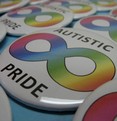 by Jeremy Pierce, Ph.D. There's a relatively new movement in the communities of people who deal regularly with autism and related conditions that's assigned themselves the term "neurodiversity" as a shorthand reference to their commitment to affirming atypical neurological conditions as equally legitimate. This movement shuns the terms 'normal' and 'abnormal' and instead prefers to speak of those who are neurotypical and those who are not. The neurodiversity movement seeks to identify various traits common with autism as neither better nor worse but simply different. This movement should be praised for its recognition that respecting people with autism requires taking into account how differently they take in information, process it, use it, and produce various responses. They rightly emphasize that an atypical neurological state need not be thought of as a disease that needs a medical cure or treatment or a disability that requires taking the person to be deficient. They recommend supporting a person for who they are rather than trying to "fix" them to conform to the standards everyone else has. Some autism advocates on the autistic spectrum insist that they wouldn't want to be made "normal" if a "cure" were ever found. They like being the way they are. There's something obviously right about most of that. The more I read stuff from this movement, however, the more disturbed I get that there's something they're just not seeing, and the good in what I just wrote is blinding a lot of well-meaning people to a serious philosophical error lying behind much of what the neurodiversity movement produces. Consider this story by Karen Kaplan of the Los Angeles Times. She is right to point out that, just because autistic people do badly on certain standardized tests, it doesn't mean they're cognitively deficient. It may well be that the reason a certain person scores low on a certain test is because the test is relying on typical patterns of language use, and someone with autism may be using a different pattern of language use. The underlying cognitive ability being tested for may be stronger than the test shows. That's all correct. But in her rush to make this point, Kaplan completely ignores the fact that the reason someone is scoring low on the test is because of a genuine deficiency in the kind of language use that most people are much better able to engage in. That means there is a lack of ability that comes with autism, even if its manifestation will be different from person to person.
0 Comments
 Another article in our series of things NTs say about Autistics. Tikatia Morris is the marketing director at NeuroDiversity Consulting LLC. Learn more here and check out the intro to the series as well as our article on discipline. "But he's so smart!" "Are you sure she isn't just faking it?" "He doesn't look autistic." "Aspergers...that's just a little socially awkward." By: Tikatia Morris In 2008, radio show host, Michael Savage had this to say about autism: "fraud, a racket. ... I'll tell you what autism is. In 99 percent of the cases, it's a brat who hasn't been told to cut the act out. That's what autism is. What do you mean they scream and they're silent? They don't have a father around to tell them, 'Don't act like a moron. You'll get nowhere in life. Stop acting like a putz. Straighten up. Act like a man. Don't sit there crying and screaming, idiot." Here is how one adult with autism described how it feels when a person doesn't believe in the diagnosis: "As if living your whole life incapable of being normal no matter how much effort you put in isn't bad enough, there are people that try to convince you that the condition you're diagnosed with doesn't exist and that you're just a social failure." Autism is, by definition, a spectrum disorder. Individuals with autism have strengths and weaknesses, just the same as their neurotypical counterparts. Some individuals have excellent verbal skills, are sociable, and enjoy being around other people regularly. This does not invalidate their diagnosis. This simply means that they have those skills as a strength. The DSM-IV lists 5 separate diagnoses under the umbrella of Autism Spectrum Disorders. These are: Autistic Disorder, Asperger's Disorder, Pervasive Developmental Disorder Not Otherwise Specified (including Atypical Autism), Rett's Disorder, and Childhood Disintegrative Disorder. Each includes it's own specific diagnostic criteria and each, while under the umbrella of Autism Spectrum Disorder, is unique unto itself as well. Since there are 5 differing disorders under this one umbrella, it wouldn't be much of a stretch to assume that each disorder differs from the others not only in diagnostic criteria, but also in severity of symptoms; hence the term Autism Spectrum Disorder. As a parent, I've often encountered comments like those quoted above from not only neurotypical strangers, friends, and family, but also from professionals such as my son's teachers. When he "perfoms" well in a school setting (mostly due to his overall anxiety from being around that many people) I find myself having to prove his diagnosis to the professionals within that school. They often end up trying to remove services claiming that he doesn't need them even when he's obviously (to me anyway) performing so well because those services are in place. In our personal world, we've come against opposition from friends, and family members alike. The frustration that ensues as a parent having to prove my son's diagnosis is immeasurable, and I'm sure that my son, were he able to explain it, would say that he is not faking his interpretations of his surroundings, nor is he simply misbehaving for the sake of attention or because he's just being a putz, as Savage claims about those on the spectrum. Even parents of autistics can fall prey to disbelief. As Jim Sinclair point out in his essay, “Don’t Mourn for Us”, parents begin on a path of either love and support or rejection the moment of their child’s diagnosis. Sinclair makes the distinction that the source of parents’ grief at an autism diagnosis has, “NOTHING to do with autism, it regards the inability to have the ‘expected relationship’ with their child." When parents continue to misplace this grief onto their child, avowing to wipe this ‘abomination’ off of the face of the earth, they are also stating that their, “greatest wish is that one day [autistics] will cease to be, and strangers you can love will move in behind our faces." When parents finally come to terms with their child's diagnosis, and accept that child for who he or she is, there is still yet another level in our disbelief pyramid. There are then the parents within each group of diagnosis who may have the tendency to belittle another child's diagnosis simply because that child may present the disorder differently from their own child. For example a parent whose child is nonverbal may scoff at a child who is capable of speech that they don't have "real" autism. Parents of children who have these milder versions of autism may feel that they don't fit in with the parents of neurotypical kids, but that they also don't have the support of other parents within the autism community. A major issue regarding autism is a lack of understanding and education, both on the parent and caregiver parts as well as on that of the neurotypical community at large. The changes proposed in the DSM-V may to help alleviate some of the skepticism and misunderstanding of autism spectrum disorders. The proposal is such that those five separate diagnoses will become one single diagnosis of Autism Spectrum Disorder with three distinct levels of severity. There is still a lot of debate within the autism community as to whether this proposition will end with positive results or negative. In conclusion, educate yourself, your families and your communities; and as the saying goes: "When you meet one autistic person, you've met one autistic person."  Here is the first in the series of Things NTs Say About Autistics. Sanchia Callender is the Services Director of NeuroDiversity Conulting LLC. Learn more here and also check out the intro to the series. “He's just spoiled...” "Are you sure he doesn't just need a little more discipline?" "All that kid needs is a good (choose one) spanking, talking to, slap on the bottom, hard whack, time in the corner etc......" Sanchia A. Callender A key feature of Autism Spectrum Disorders (ASD) is the impairment of social skills; for these children simple social behavioral norms are mysterious and sometimes pointless endeavors. In addition to social skill impairments children with ASD often have difficulties communicating in a manner that makes sense to anyone but themselves without careful examination; add to this some stereotypical behaviors and movements and the tendency to be preoccupied with particular topics or activities and you have the perfect storm for challenging behaviors. Matson, Neal, Fodstad, and Hess (2010) define challenging behaviors as “intense and persistent culturally abnormal behaviors which are disruptive and destructive in nature (p.165).” Aggression, self-injury, property destruction, and non-compliance and stereotypies (stimming) are the most common “challenging behaviors” associated with ASD (Matson et al., 2010). Challenging behaviors are often one of the biggest hindrances for children with ASD and the most common source of stress for parents and caregivers (Matson et al., 2010; Leone and Wiltz, 2006). Parents and caregivers of children with ASD report higher levels of stress than parents of children with other disabilities. Emotional burnout is common in this population and often results in decreased positive interactions and avoidance of social situations (Matson et al., 2010; Leone and Wiltz, 2006). Missed opportunities to participate in activities that would promote social learning through positive peer interactions can lead to increases in the challenging behavior that led to the initial avoidance. Another difficult aspect of challenging behaviors in children with ASD is the functionality of these behaviors in meeting the child’s needs. As bizarre, problematic, embarrassing, and dangerous as some of these behaviors may seem they are at some level meeting a need for the child. It is important to understand the function of a behavior before modification can be considered. Even in situations with dangerous or injurious behavior understanding the antecedents or functions of the behavior are just as important to a child’s safety as stopping the behavior. In the midst of a behavioral outburst, especially one taking place in a very public place, it is difficult to focus on understanding the function of the behavior and addressing it in a manner that stops the unwanted negative behavior and promotes more productive appropriate means of communicating. Many parents and caregivers often find themselves dealing with unwanted comments and negative assessments of their parenting skills. This makes an already stressful, uncomfortable situation even more difficult. Since it is likely that even with the most extensive well thought out public education initiatives could not curtail this unwanted and unnecessary commentary it just needs to be ignored until the pill for stupid hits the market. As a parent your focus and responsibility is to maintain your and your child’s mental, emotional, and physical wellbeing. While there are many interventions that can be used to decrease or prevent challenging behaviors over time parents and caregivers will likely always have some behavioral issue they are dealing with. It is important to remember that parents and care givers need to extend the understanding to others that they would like for themselves and their families. It is important to be mindful of your child’s limitations and tolerance levels and to the best of your ability avoid placing them in situations they do not yet have the capability to navigate. For example if your child with an ASD has a history of breaking glass objects you should probably not take them to a friend’s home who collects expensive glassware. Having a child with ASD is kind of like telling a dirty joke; you have to know your audience and expect that even in the most receptive of crowds there will always be a few who just don’t get it. References Leone, L. L. S. & Wiltz, J. (2006). The impact of behaviour problems on caregiver stress in young people with autism spectrum disorder. Journal of Intellectual Disability Research, 50(3), 172-183. Matson, J. L., Neal, D., Fodstad, J. C., & Hess, J. (2010). The relation of social behaviours and challenging behaviours in infants and toddlers with autism spectrum disorders. Developmental Neurorehabilitation, 13(3), 164-169. An Introduction
By Samantha Pierce If you’re the parent of someone on the autism spectrum you have probably been the beneficiary of some unsolicited advice from strangers, friends, and family. A few months back I asked my Facebook friends to share things that neurotypical people (NTs) said to them about autistics that they found irritating. I was intending to make a list with a few snarky comments added in to pass around to friends and family. After more than forty responses that translated into a four page document I realized that I had hit a nerve with my question. There was a lot of raw emotion, expressed mostly by parents of autistic individuals, stirred up by the comments that many of us endure from friends, family, and strangers. My idea of making a simple list went out the window and I instead decided to do a series of articles discussing the kinds of comments my friends reported having to deal with. So far I’ve sorted the many comments I received into five categories: discipline to address the many comments that either implied or outright stated that parents of autistic children were failing to properly discipline their children; disbelief to address the comments from people who seemed to have difficulty accepting that autism is real and the individuals they were dealing with really were autistic; diagnosis to discuss those comments about the nature of autism and what autistics can and can not do; disdain to discuss comments that talked down to and dehumanized autistics; disinformation to address those comments that actively pushed unsupported and disproven information about autism. Hopefully this series will shed a little light on autism and encourage people to think twice about what the choose to say to and about autistics. |
Categories
All
Archives
December 2021
|
Photo from Hayzphotos
 RSS Feed
RSS Feed
